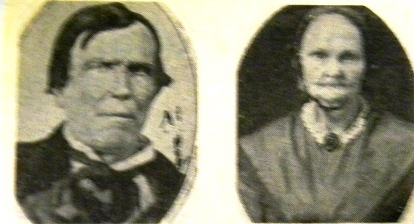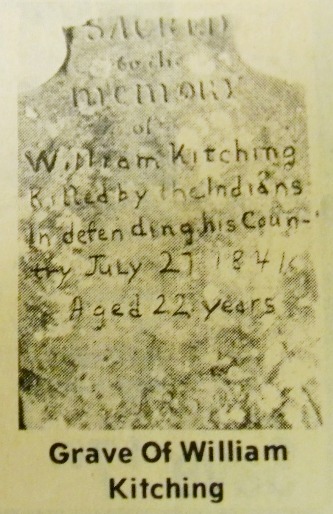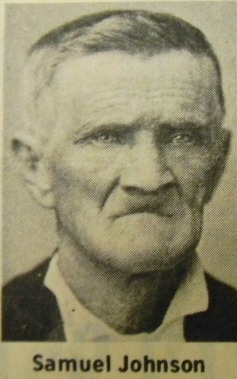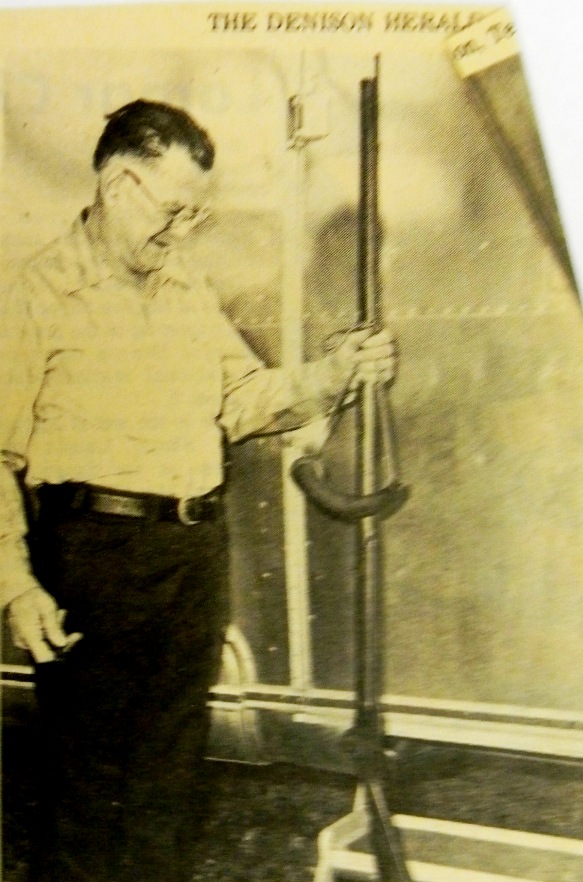KITCHING FAMILY
Grayson
County, Texas

The Denison
Herald
March 14, 1976
by Donna Hunt
Last
week in discussing the Dugan family of Bells in this column, we
mentioned that in the summer of 1840 Daniel V. Dugan asked a neighbor
boy to help him cut logs to build a house on Choctaw Creek about two
miles from his father's house.
The boy failed to return home and the family, after riding to the camp,
found that both had been killed and scalped.
It
turns out that the "neighbor boy" mentioned was William Kitching,
brother of Charles Johnson's grandmother, Malinda. And the
year
was 1841, not 1940.
Johnson, who resides at 501 West Sears, is retired from the radio and
television repair business.
While
Kitching is often seen spelled Kitchens, Johnson has proof in the form
of photos of tombstone markers, old letters and family photos with
names written on them many years ago that the spelling is
k-i-t-c-h-i-n-g.
William Kitching was one of five children born to
John and Nancy Kitching. William was born in Holland and his
father stowed away on a ship for America to work two years before
sending for his family.

JOHN
& NANCY KITCHING
William's
sister, Malinda, married Samuel Johnson and became Charles Johnson's
grandmother. Her sister, Melissa, married Samuel's brother,
Alfred.
William was killed by Indians on July 27, 1841 and is buried next to
Daniel Dugan, who was killed at the same time.
In
1841, many families moved to this area where Rangers had been working
unceasingly trying to make it a peaceful place to live. Among
these settlers were the John Kitching family, a Methodist minister
named Rev. Spivey, and families named Green and Long.
John Kitching rented a farm near the Daniel Dugans, where he began to
raise a crop.
In
July, after the crops were "laid by," Daniel V. Dugan engaged William
Kitching to help him get cut logs for a house he was going to build on
his land before he brought home a young bride. Two days
after, they
set up their camp. William's father was working up above
Choctaw
on business when he heard that an Indian party of Renegades had crossed
Red River near Preston Bend and were headed for the settlements.
John
Kitching hurried to tell his son and Dugan that they should return home
until the Indians were captured. Upon arriving at the camp he
found all quiet and no one in sight, thus surmising that the boys had
already returned home.
He stopped by the Dungan's home to inquire of
the young men and to his horror found that they had not been seen since
they left home two days before.
Rangers were summoned to help in
searching for the missing boys but were off in another
direction.
Friends and neighbors gathered and a search party was formed to leave
at
sunup. A few men were left to guard the families at the home
in
case of a surprise attack.
At mid-morning one of the searchers rode
full speed back toward the house where the boys' mothers awaited word.
He told the story of how the search party had reached the woods around
camp and found William Kitching's body lying where he and Dan Dugan had
been cutting logs. He had been shot and scalped.
When the
message carrier returned to the camp with a wagon to bring home the
body, he was told that Daniel had been found about 300 yards from where
Kitching lay.
Evidence of a desperate fight was found in the area.
The boys were buried the next day side by side in a beautiful spot on
the Dugan farm.

The
next Sunday after church services John Kitching, his son, Dan, and a
young man named Stephens were sitting in the yard, their guns nearby.
His
wife and daughters were doing their evening chores in the one-room
unchinked cabin when a horse chained to the wagon in the yard suddenly
began to act uneasy. Without further warning three shots rang
out, two of which struck Kitching and Dan in the foot as they sprang
for the house leaving their guns in the yard.
Kitching returned to
the yard, and as bullets whizzed by him, handed the guns to his
son. The women helped out as the men returned fire.
Several
bullets found their target.
After the Indians left, carrying their dead, Kitching put Dan on his
fastest horse and sent him to warn the Dugans.
A party of men returned home with Dan and helped move the Kitching
family to the Dugan farm where they camped in the yard.
On
Nov. 27, 1842, Malinda Kitching married Capt. Samuel Johnson, a Ranger,
and they settled on Caney Creek in Fannin County. The couple camped
under the shade of a post oak tree until they could build a house to
live in.
Charles Johnson has a letter dated 1880 that tells of the
marriage, building of the house and how Bonham had not been founded at
that time. It continues that the young couple had no meat nor
bread, but managed to get a morsel for supper.

Samuel
Johnson is a complete story himself. He and his brother,
Alfred,
who later married Melissa Kitching, joined the Alabama Volunteers in
1835 and arrived at San Jacinto just after the battle was
over.
They were assigned to help with the prisoners, among whom was Santa
Anna himself.
Samuel was discharged from the Texas Army in Victoria
in July, 1836, and joined the Rangers. He was made lieutenant
in
Capt. James Bourland's Company in 1841, then captain of a Ranger Spy
Company and sent to Fort Warren to help quell the Indian uprising.
Samuel
died Nov. 8, 1887, and Malinda died April 12, 1902. They were
the
parents of nine children, one of which was John K., Charles Johnson’s
father.
Charles has among mementoes of his brave ancestors copies of
letters, actual photographs, Confederate tax receipts dating back to
1864, a copy of Samuel Johnson's discharge dated July 22, 1936, wills,
Confederate money and many other interesting keepsakes.
 |
GRANDDAD'S
MUSKET - Charles Johnson of Denison holds a musket that was carried by
his grandfather, Samuel Johnson when he served in the Texas
Army.
He was discharged in 1836. |
|

BIOGRAPHY INDEX
Susan Hawkins
© 2024
Grayson County TXGenWeb
|